|
|
|
Sort Order |
|
|
|
Items / Page
|
|
|
|
|
|
|
| Srl | Item |
| 1 |
ID:
150457


|
|
|
|
|
| Summary/Abstract |
Research on household energy conservation often categorizes targeted behaviours by their behavioural attributes (e.g., savings, cost, frequency). The most common distinction in the literature divides behaviours as follows: (1) low-impact, low-cost, repetitive behaviours that result in a loss of comfort or curtailment behaviours and (2) high-impact, high-cost, infrequent behaviours that result in no loss of amenities or efficiency behaviours. However, such categorizations have often been ad hoc and two-dimensional (e.g., low-impact vs. high-impact, low-cost vs. high-cost). In contrast, we systematically assess a large range of household energy-saving behaviours (N=261) across nine attributes – energy savings, cost, frequency of performance, required skill level, observability, locus of decision, household function, home topography, and appliance topography. By clustering behaviours according to these attributes, we discern four clusters of energy-saving behaviours: family style, call an expert, household management and weekend project. We discuss the implications of these clusters for intervention design.
|
|
|
|
|
|
|
|
|
|
|
|
|
|
|
|
| 2 |
ID:
185847


|
|
|
|
|
| Summary/Abstract |
The Antarctic Treaty System provides the corpus of law that governs the obligations of its Parties to protect and conserve the Antarctic environment. The System consists principally of the Antarctic Treaty (the Treaty), the Convention on the Conservation of Antarctic Marine Living Resources (CAMLR Convention), and the Protocol on Environmental Protection to the Antarctic Treaty (Environmental Protocol). The Antarctic Treaty establishes the Antarctic Treaty Consultative Meeting – the body that makes decisions under the provisions of the Treaty and Environmental Protocol. The CAMLR Convention establishes the Commission for the Conservation of Antarctic Marine Living Resources (CCAMLR) – its decision-making body. Together, these two international bodies are responsible for the modern-day conservation and environmental management regimes for Antarctica and the Southern Ocean. This paper looks at the scope of law developed under the Antarctic Treaty System and its evolution; and at the interaction between the different components of the Antarctic Treaty System. The paper also forecasts some of the future challenges to conservation and environmental protection in Antarctica and the Southern Ocean.
|
|
|
|
|
|
|
|
|
|
|
|
|
|
|
|
| 3 |
ID:
099461
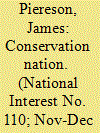

|
|
|
| 4 |
ID:
095058
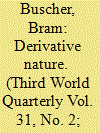

|
|
|
|
|
| Publication |
2010.
|
| Summary/Abstract |
Many conservationists nowadays talk about the urgent need to value nature. To bring out the 'true value' of nature and make conservation compatible with poverty reduction, so the argument goes, it must be appropriated into the realm of commodities and priced in monetary terms. By employing the concept of 'derivative nature', this paper explores the consequences of this neoliberal move. Derivatives are financial mechanisms whose monetary value is literally derived from the value of underlying assets. They were originally devised to reduce risk in the marketplace, but have actually made the global financial market immensely more complex and created more systemic risk and uncertainty because of their susceptibility to speculation. The paper suggests that similar processes can be seen in the arena of conservation. It argues that both nature and 'the poor' are increasingly becoming 'underlying assets' for what has become the 'real' source of value of neoliberal conservation, namely images and symbols within the realms of branding, public relations and marketing. Empirically grounded in a discussion on transfrontier conservation in Southern Africa in the run-up to the 2010 soccer World Cup, the paper examines the consequences of 'derivative nature' and calls for critical thinking to start facing these consequences.
|
|
|
|
|
|
|
|
|
|
|
|
|
|
|
|
| 5 |
ID:
121351


|
|
|
|
|
| Publication |
2013.
|
| Summary/Abstract |
Ecuador's energy policy faces a complex variety of political and economic objectives that are difficult to reconcile in a consistent manner. Ecuador is a small oil producer and exporter with significant renewable (mainly hydropower) resources, hosting some of the richest biodiversity areas in the world, part of which are inhabited by so far indigenous un-contacted people. Being a developing country, tensions arise between conservation aims and development imperatives, as well as between resource nationalism and much-needed foreign financing. However, the really limiting factor for the country's energy development seems to be its constraints in financing the government's development and redistributive policies. Resorting to Chinese loans-for-oil may be part of the solution in the short term, but it does not substitute for a more consistent energy policy. Ecuador's case illustrates the dilemmas of energy policy in natural resource-rich developing countries when confronted with diverging political economy, social, environmental and macro-financial goals.
|
|
|
|
|
|
|
|
|
|
|
|
|
|
|
|
| 6 |
ID:
183084
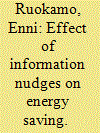

|
|
|
|
|
| Summary/Abstract |
Field experiments have shown that information nudging can help households to save energy, however, the effectiveness varies depending on aspects such as information content, delivery mode and study area. This article evaluates the impacts of information nudges on residential electricity consumption with a randomized field experiment. This opt-in experiment was conducted in Finland. Information was administered via monthly email newsletters and an online energy service platform. The aim is to find out whether i) energy saving tips combined with and without online energy service platform providing electricity consumption information, and ii) peer comparisons (i.e., social norm) influence households’ electricity consumption. The results show a high seasonal variation in the treatment effects within the groups who were registered users of the online energy service platform. Those with access to usage feedback and versatile energy savings tips (without the social norm comparisons) reduced their electricity consumption around 10% in wintertime. The results imply challenges in encouraging energy saving behavior among households less interested in following their electricity consumption.
|
|
|
|
|
|
|
|
|
|
|
|
|
|
|
|
| 7 |
ID:
082385
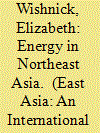

|
|
|
|
|
| Publication |
2008.
|
| Summary/Abstract |
Although Northeast Asia typically is seen as an arena for conflict over energy supplies, complementary economic relationships would seem to make the region ripe for energy cooperation: Russia possesses major oil and gas resources, while China, Japan, South and North Korea all depend on imported energy. The four papers in this issue raise a number of important and, at times, neglected issues about the prospects for energy cooperation in Northeast Asia. While focusing on specific projects for energy supply and conservation, the authors implicitly raise broader theoretical questions about the prospects for and consequences of regional energy cooperation
|
|
|
|
|
|
|
|
|
|
|
|
|
|
|
|
| 8 |
ID:
120214
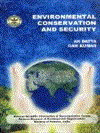

|
|
|
|
|
| Publication |
New Delhi, DRDO, 2006.
|
| Description |
x,349p.hbk
|
| Series |
DRDO Monograph Series
|
| Standard Number |
8186514163
|
|
|
|
|
|
|
|
|
|
|
|
Copies: C:1/I:0,R:0,Q:0
Circulation
| Accession# | Call# | Current Location | Status | Policy | Location |
| 057257 | 363.7/DAT 057257 | Main | On Shelf | General | |
|
|
|
|
| 9 |
ID:
156526
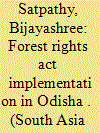

|
|
|
|
|
| Summary/Abstract |
The Forest Rights Act (FRA) 2006 claims to devolve ownership to local forest dwellers in India, to provide local communities with better tenurial security and allow increased rights over forest resources. One argument for this is the redressal of historical injustices, particularly to tribal people. Offering a reality check, this article scrutinises the interface of informal and formal institutions with respect to livelihood of forest-dependent communities and forest conservation to identify ongoing implementation challenges. Empirical data from two villages of Mayurbhanj district in Odisha use oral history, focus group discussions and in-depth interviews with different actors in FRA implementation as evidence. Asymmetric information flow, deficient coordination, undemocratic participation, dearth of transparency and lack of accountability at various levels hinder FRA implementation, which claims to safeguard the basic rights of disempowered local people, but does not appear to deliver ‘complete justice’.
|
|
|
|
|
|
|
|
|
|
|
|
|
|
|
|
| 10 |
ID:
099617
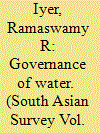

|
|
|
|
|
| Publication |
2010.
|
| Summary/Abstract |
The term 'water governance' encompasses a wide range of issues of water policy, management, sharing, rights, conflicts, social justice and equity, conservation, sustainability and so on; and almost all of them involve legal questions. This article provides a broad overview, both explanatory and prescriptive, of some of the legal issues relating to water. These will include the question of ownership of water; the relationship between the state and civil society; the doctrine of public trust; the distinction between the right to water (that is, water as life-support) and water rights (use rights such as for agriculture, industry, etc.); water-related disputes of all kinds (including river water disputes) and the principles, entitlements, relative priorities and institutional arrangements needed for avoiding or resolving them; water markets and the question of privatisation of water; the regulation of water use in the interest of equity, social justice, harmony and sustainability and so on.
|
|
|
|
|
|
|
|
|
|
|
|
|
|
|
|
| 11 |
ID:
190953
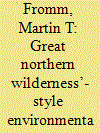

|
|
|
|
|
| Summary/Abstract |
One of the epic national narratives of modernization and development in China is the story of Beidahuang (‘Great Northern Wilderness’) in the country’s northeast. The term ‘Beidahuang’ refers originally to state-sponsored campaigns, starting in the 1950s, that involved the enlistment of tens of thousands of People’s Liberation Army soldiers, educated youth, and Communist Party cadres. Their task was to transform the vast northeast ‘wasteland’ into productive farmland that would feed the nation while securing the nation’s borders with Russia. This article examines the significance of Beidahuang as a feature of the environmental discourse in China’s northeast borderlands, focusing on the first decade of the twenty-first century when the Chinese state was establishing more systematic measures for addressing environmental concerns. In the context of the northeast borderland, the massive deforestation that resulted from the socialist campaigns to transform ‘wasteland’ into productive farmland has left a controversial legacy for regional elites grappling with the Party leadership’s turn towards environmental conservation as an emerging political priority. This article suggests that the ongoing importance of the ‘Great Northern Wilderness’ in the Chinese cultural imagination has shaped the ways in which regional elites frame environmental issues in relation to economic development, nationalism, and border relations with Russia.
|
|
|
|
|
|
|
|
|
|
|
|
|
|
|
|
| 12 |
ID:
173195
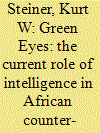

|
|
|
|
|
| Summary/Abstract |
Intelligence is a practice that is becoming more frequently used within the conservation industry. This article examines the question of what role intelligence currently plays in counter-poaching within Protected Areas in Africa. Through research into existing literature, combined with interviews conducted in the field with practitioners active in 19 countries, it concludes that while intelligence practices have been randomly adopted by various conservation organisations in the past, and are currently being applied with varying degrees of success, they are fast becoming more professionalised and more effective.
|
|
|
|
|
|
|
|
|
|
|
|
|
|
|
|
| 13 |
ID:
189908
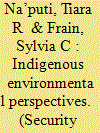

|
|
|
|
|
| Summary/Abstract |
This article centers Indigenous epistemologies to critique the United States oceanic security state, a modality of militarization and blue-washing conservation that extends beyond land borders to encompass federal conceptualizations of national security throughout the Pacific Ocean. Beginning with Indigenous perspectives from Oceania, it provides examples of Indigenous peoples’ continuing connections to ocean spaces and challenges to United States colonial geographic imaginaries and militarized destruction. Then, advancing the concept of the oceanic security state, it examines how United States assertions of sovereignty over Oceania are used to justify hyper-militarization while simultaneously destroying the environment and contributing to the climate crisis. These phenomena occur while the USA remains exempt from federal environmental conservation laws through ‘blue-washing’, and the United States government benefits from the exclusion of military emission data within international climate targets. The findings reveal how militarizing all ocean space in the name of United States national security operates within delineated borders of Exclusive Economic Zones, Marine National Monuments, and Marine Protected Areas. Guided by Indigenous epistemologies, the article concludes with alternative ways of understanding ocean spaces and constructing futures of genuine security.
|
|
|
|
|
|
|
|
|
|
|
|
|
|
|
|
| 14 |
ID:
179108


|
|
|
|
|
| Summary/Abstract |
The phenomenon of local knowledge of the fishing community about fish ethology and conservation of existing natural resources are investigated in this article. It explores the inextricably intertwined aspects and long-lasting constructive dependence of marine resources with a symbiotic relationship as critical components for integration with marine ecology. Lastly, the paper emphasizes the significance of local knowledge beliefs and systems which promote natural marine conservation methods for increased economic prosperity. The study focuses on the Telugu marine fishing community in South India.
|
|
|
|
|
|
|
|
|
|
|
|
|
|
|
|
| 15 |
ID:
193467
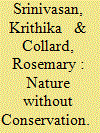

|
|
|
|
|
| Summary/Abstract |
The predominant approach of protecting or restoring floral and faunal life after harming, displacing, or destroying them in service of human interests does not hold much promise for nature on Earth in the age of the Anthropocene. Such approaches fail to address the ethical and political-economic cores of what tend to be presented as techno-scientific or ecological problems. If the planet is to remain home to life beyond the human, mainstream human societies need to rethink their place, role, and entitlements on Earth, and relearn to cohabit with human and nonhuman others, even in the face of risk and uncertainty.
|
|
|
|
|
|
|
|
|
|
|
|
|
|
|
|
| 16 |
ID:
127928
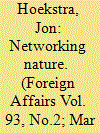

|
|
|
|
|
| Publication |
2014.
|
| Summary/Abstract |
Conservation is for the first time beginning to operate at the pace and on the scale necessary to keep up with, and even get ahead of, the planet's most intractable environmental challenges. New technologies have given conservationists abilities that would have seemed like super powers just a few years ago. We can now monitor entire ecosystems -- think of the Amazon rainforest -- in nearly real time, using remote sensors to map their three-dimensional structures; satellite communications to follow elusive creatures, such as the jaguar and the puma; and smartphones to report illegal logging.
|
|
|
|
|
|
|
|
|
|
|
|
|
|
|
|
| 17 |
ID:
100029
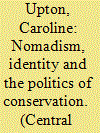

|
|
|
|
|
| Publication |
2010.
|
| Summary/Abstract |
This paper highlights the continuing importance of nomadism as an aspect of identity in contemporary Mongolia, and one which retains strategic, discursive and material resonance at diverse scales. It examines the contested representations and practices of nomadism with particular reference to conservation and to relations with land and nature. At a national level, nomadism remains a powerful, albeit romanticized, symbol of collective identity, often deployed, for example by urban elites with reference to a 'glorious past' (Bruun 2006). At the same time emergent urban identities are increasingly important in informing national self-representations of Mongolia, while contemporary nomadic herders are subject to contrasting discursive portrayals in mainstream conservation debates and policies. Particular concepts of relations with nature, including re-emergent spiritual dimensions, are highlighted as aspects of nomadic identity and practice at local levels, and their contrasts to and accommodation with donor-driven conservation projects explored. Finally, the paper highlights the emergent Global Pastoralists' movement as an important arena wherein Mongolian pastoralists can begin to deploy their own discursive representations of contemporary nomadic identities.
|
|
|
|
|
|
|
|
|
|
|
|
|
|
|
|
| 18 |
ID:
079670
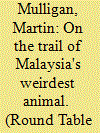

|
|
|
|
|
| Publication |
2007.
|
| Summary/Abstract |
The rainforests and mangrove wetlands of Malaysia and Southeast Asia are among Earth's most naturally rich environments; temperate countries are poor by comparison. A high proportion of animals and plants in these tropical rainforests, the outcome of 60 million years of evolution, live nowhere else. So the importance of work to conserve this region is apparent. Yet much of this work is left to the so-called GONGOS - or government-owned non-governmental organizations. The GONGO is a species of organization that is found world-wide wherever democracy is new or fragile or otherwise less than fully functioning. Despite frustrations and constraints, however, tiny groups of idealists within this framework may influence and even transform government policy
|
|
|
|
|
|
|
|
|
|
|
|
|
|
|
|
| 19 |
ID:
171909
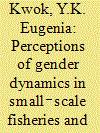

|
|
|
|
|
| Summary/Abstract |
The Tonle Sap Lake of Cambodia is one of the most productive ecosystems in the world, supporting millions of small‐scale fisher livelihoods. Women's contributions in these fisheries are often overlooked due to socio‐cultural expectations of roles and responsibilities. This is a crucial omission since climate and anthropogenic influences increasingly threaten lake inhabitants. Addressing these challenges requires the full participation of both men and women who use the lake, thus it is necessary to first understand the social dynamics of these communities. We investigated whether there were differences between men's and women's perceptions of (i) fishing and non‐fishing practices; (ii) power, access and control over fishing resources; and (iii) perceptions towards conservation and conservation areas in Pursat, Cambodia. We interviewed fishers and key informants, and found differences in perceptions of fishing and non‐fishing practices between fishermen and fisherwomen. Men more openly acknowledged unequal power dynamics, access to and control over fishing resources when compared with women. We found contrasting ideas of community fisheries and conservation between men and women, and health and safety challenges they faced in conservation areas. Findings suggest that community perspectives and unequal power relations established specific roles for women that limited their active participation in fisheries management.
|
|
|
|
|
|
|
|
|
|
|
|
|
|
|
|
| 20 |
ID:
140241


|
|
|
|
|
| Summary/Abstract |
Since the fall of long-time strongman Suharto and his authoritarian ‘New Order’ government in 1998, Indonesia has embarked upon a series of decentralisation and democratisation reforms. This new era of decentralised politics has come to be known as Reformasi and has significantly altered the political landscape of the archipelago as national and subnational levels of administration continue to contest the balance of power. Indonesia's national parks, which remain under the authority of the national government, have become arenas for negotiated encounters between local resource users, aspiring district elites and the national government. This essay explores three legacies of incomplete and unfinished decentralisation as they related to national-park-based conservation, using Sumatra's Kerinci Seblat National Park as a case study.
|
|
|
|
|
|
|
|
|
|
|
|
|
|
|
|
|
|
|
|
|